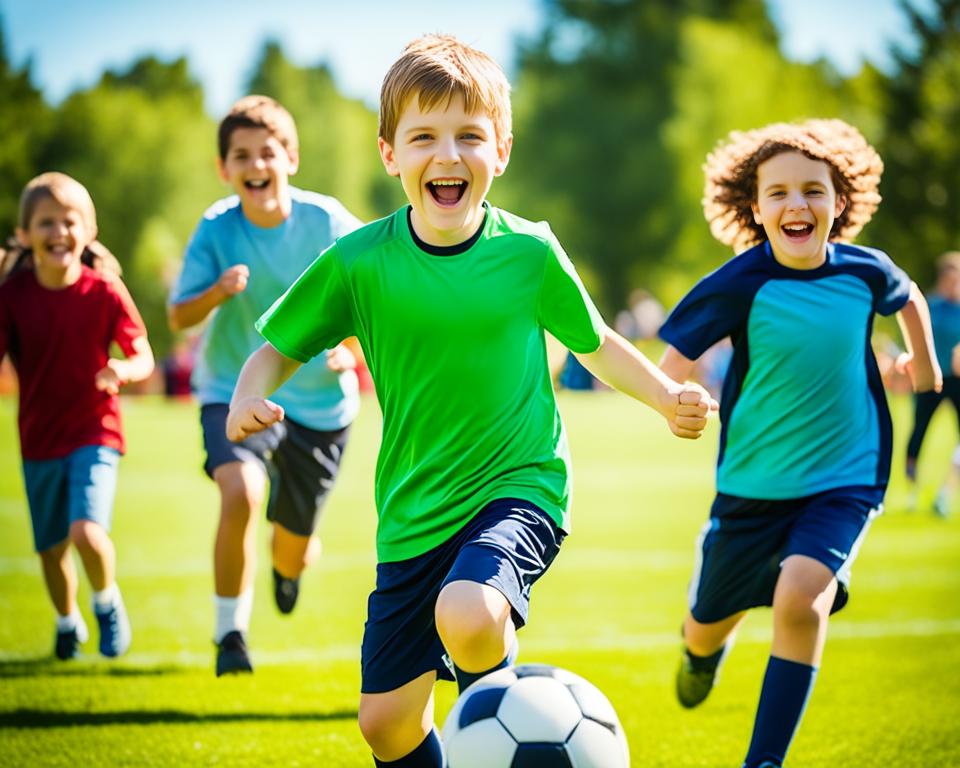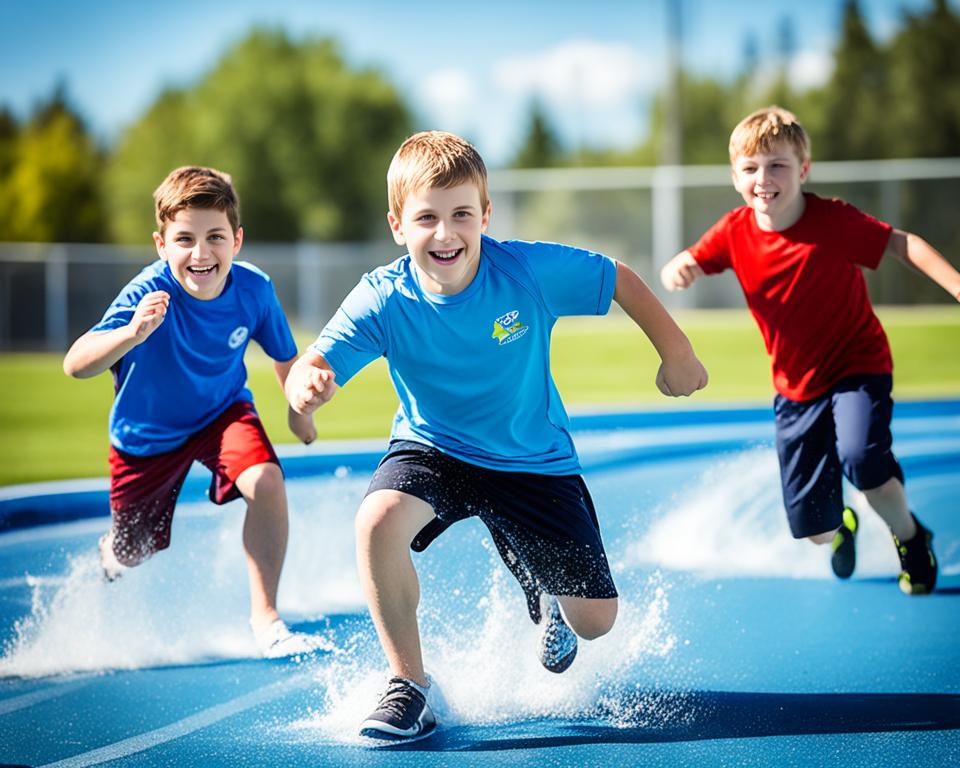It's crucial to know that students with autism and ADHD need special study strategies. Autism…

Top Best Sports for Autism – Engage and Boost Skills
Finding the right sporting activity can be a game-changer for individuals navigating the challenges of autism. When it comes to selecting the best sports for autism, it’s important to consider environments that are autism-friendly and tailored to the unique needs of these athletes. With the right sports programs for children with autism, participants can enjoy benefits beyond physical health, including improved social skills and cognitive development.
Fortunately, there are many sports activities for individuals with autism that strike a balance between fun and functional. From inclusive sports for individuals with autism to more adaptive sports for autism, these activities are designed to be accessible and engaging. Activities such as swimming and track often provide the sensory moderation necessary for those who may find typical sports settings overwhelming.
Offering sensory-friendly sports for autism means creating a supportive environment where young athletes can thrive without the stress of sensory overload. Program providers like the Challenger Club have made great strides in ensuring that their activities are safe spaces for enjoyment and growth. In addition, therapeutic sports for autism such as horseback riding and martial arts can play a significant role in enhancing coordination and building confidence.
Every child has their own strengths and interests, leading to certain sports for autistic kids being more suitable than others. Ultimately, finding these optimal physical activities means recognizing and fostering what each child enjoys and can benefit from the most.
Key Takeaways
- Explore a variety of sports activities for individuals with autism to discover the best fit.
- Engagement in autism-friendly sports can significantly enhance motor skills and socialization.
- Programs like the Challenger Club prioritize inclusive sports for individuals with autism.
- Sensory-friendly sports for autism are tailored to reduce sensory triggers and boost participation.
- Therapeutic sports for autism offer both physical and cognitive developmental benefits.
- Seek out recommended sports for autism that align with a child’s personal abilities and interests.#
Understanding the Benefits of Sports for Individuals with Autism
Encouraging participation in sports activities for individuals with autism is not merely about physical development—it encompasses a whole host of benefits that touch on aspects vital for personal growth and well-being. From the joy of movement to the thrill of achievement, sports offer a unique pathway to enrichment and empowerment for children with autism.
The Importance of Physical Activity and Sensory Engagement
For many living with Autism Spectrum Disorder (ASD), regular physical activity can lead to significant improvements in life. Exercise through autism-friendly sports not only strengthens muscles and joints but also provides essential sensory input that helps improve coordination and balance. Moreover, the endorphins released during physical exertion are natural stress-relievers, helping to alleviate anxiety and enhance mood. Sports such as swimming and running cater to diverse preferences, and they foster essential life skills including discipline and focus.
Improving Social Skills Through Structured Sports Programs
Structured sports programs are instrumental in nurturing social competencies among sports for autistic kids. Within these programs, children have opportunities to learn communication, understand the importance of teamwork, and also cultivate self-confidence. Participating in inclusive sports for individuals with autism can transform sports from challenging endeavors into platforms for social learning and connection, making way for growth in areas beyond physical health.
Adaptive Sports and The Role of Accommodating Sensory Needs
The world of adaptive sports for autism is rich with opportunities tailored to meet sensory and cognitive needs. These sports are designed to be flexible, considering factors like noise levels and social dynamics, thus creating a supportive environment where autistic individuals feel safe to express themselves and enjoy their athletic pursuits. By incorporating repetitive movements and routines, activities like martial arts and dance amplify coordination skills and present a harmonious blend of creativity with physical exercise.
Ultimately, the key to a successful experience in recommended sports for autism lies in the thoughtful adaptation of activities to suit the varied sensory profiles of individuals with ASD. When their unique needs are met, sports can shine as a beacon of development, joy, and inclusion for those on the spectrum.
Best Sports for Autism – Individual Focus for Skill Building

For children with autism, engagement in sports activities for individuals with autism can play a pivotal role in their physical and emotional development. Single-player or individual-focused sports are especially advantageous, as they provide a platform for significant skill-building without the pressure of a group setting. This allows individuals on the autism spectrum to thrive and gain fulfillment from personal accomplishments.
- Golf: Fosters concentration and offers a calming environment ideal for those who prefer a gentle pace and minimal sensory overstimulation.
- Tennis: Besides physical exercise, tennis helps improve hand-eye coordination and offers a clear structure for play.
- Swimming: Known as one of the best sports for autism, it is highly therapeutic and enhances motor skills in a sensory-friendly environment.
- Cycling: Encourages balance and body awareness, essential components for children seeking autism-friendly sports.
- Martial Arts: Introduces a routine and structure, supporting children who benefit from predictable and repetitive movements.
- Bowling: Offers a combination of physical activity and sensory experiences at a pace that is comfortable for the individual.
These tailored sports programs for children with autism not only focus on physical well-being, but are also therapeutic sports for autism, facilitating social skills and behavioral improvements. By participating in such activities, children can experience a sense of routine and familiarity, leading to a safe space where they can express themselves and grow in confidence.
Organizations like Total Education Solutions recognize the importance of individualized support in sports, ensuring that each child engages in activities that resonate with their unique preferences and needs.
Conclusion
The journey through the world of sports for individuals with autism is not uniform, but rather a testament to the beautiful diversity of abilities and preferences among these children. Selecting the right sports activities for individuals with autism does more than just build physical skills; it opens doors to personal empowerment and communal interactions. Embracing the variety of recommended sports for autism ensures that each child can find a niche that resonates with their unique needs and joys.
Embracing Individual Differences in Sports Engagement
Inclusivity in the arena of sports means recognizing that the one-size-fits-all mentality falls short. Instead, we acknowledge that individual-focused, autism-friendly sports can bring profound benefits, particularly in addressing sensory and coordination challenges. When the best sports for autism are identified and adapted to each participant, the result is not merely inclusion but a celebration of individual strengths. Such sports, be it adaptive sports for autism like swimming, or quieter environments for activities like golf, play pivotal roles in enhancing life skills and overall well-being.
Encouraging Lifelong Physical Activity and Social Inclusion
Instilling the value of lifelong physical activity begins with supportive experiences and positive associations. The role of families and educators is crucial in fostering an environment where sports for autistic kids are approached with enthusiasm and understanding. Offering a selection of inclusive sports for individuals with autism ensures that interest in physical activity is not a fleeting phase but a sustainable, enjoyable part of everyday life. Through compassionate coaching and peer support, children with autism advance not just in athletic ability but also in social skills and self-confidence. Thus, the collective goal is to weave physical activity into the fabric of social inclusion, empowering individuals with autism to thrive in all areas of life.
FAQs
What are some of the best sports for individuals with autism?
Some of the best sports for individuals with autism include swimming, track and field, bowling, golf, tennis, martial arts, cycling, and horseback riding. These sports can be adapted to be more autism-friendly and focus on individual performance rather than team competition, which is often more comfortable for those on the spectrum.
What makes a sport autism-friendly?
An autism-friendly sport typically offers a sensory-friendly environment, accommodates individual needs, provides structured activities, and reduces social pressures. These sports also allow for flexibility in participation and often focus on individual achievement rather than team dynamics.
How do sports activities benefit individuals with autism?
Sports activities help individuals with autism by offering physical activity that can enhance coordination and muscle strength, creating a sensory-rich environment that can help manage sensory sensitivities, and providing opportunities to develop social skills and self-confidence in a structured setting. Additionally, therapeutic sports can offer mental health benefits.
Can team sports be adapted for children with autism?
Yes, team sports can often be adapted to meet the needs of children with autism by making accommodations such as smaller teams, quieter environments, or having more supportive and understanding coaches and teammates who can facilitate a positive experience.
Are there specialized sports programs for children with autism?
Yes, there are specialized sports programs designed specifically for children with autism. These programs often focus on inclusivity, skill-building, and enjoyment rather than competition. They may also provide additional support such as trained coaches or therapists who understand the unique challenges faced by children with autism.
What considerations are important when introducing a child with autism to a new sport?
When introducing a child with autism to a new sport, it is important to consider the child’s sensory preferences, communication styles, and stress triggers. Starting slowly, utilizing visual aids or social stories, and ensuring the environment is supportive and patient can also make the introduction smoother. Involving the child in the decision-making process so they feel a sense of control and anticipation can be beneficial as well.
Why are individual-focused sports recommended for children with autism?
Individual-focused sports are recommended for children with autism because they allow children to progress at their own pace, reduce the anxiety associated with team dynamics, and help them focus on personal skill development. These sports also cater to individual interests and strengths, which can enhance motivation and enjoyment.
How do adaptive sports accommodate sensory needs?
Adaptive sports accommodate sensory needs by adjusting equipment, rules, or the environment to minimize sensory overload. This can include using noise-reducing headphones, providing quiet zones, modifying lighting, or reducing the number of spectators to create a more sensory-friendly experience for participants.
What role do parents play in their child’s participation in sports?
Parents play a crucial role in their child’s participation in sports by providing support, encouragement, and advocacy. They can help by selecting appropriate sports, ensuring coaches and programs are informed about their child’s needs, preparing their child for new experiences, and providing coping strategies for sensory or social challenges.
How can martial arts be therapeutic for individuals with autism?
Martial arts can be therapeutic for individuals with autism as it emphasizes routine, structure, and repetition, all of which can be comforting for those on the spectrum. The focus on individual progress, discipline, and self-control can help with building self-confidence, reducing anxiety, and improving focus and motor skills.



This Post Has 0 Comments